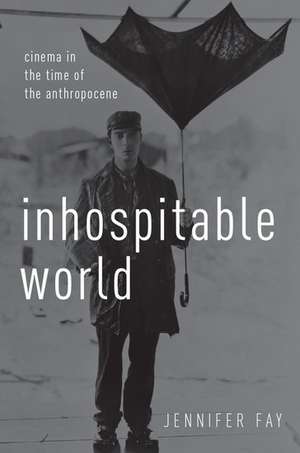Inhospitable World: Cinema in the Time of the Anthropocene
Autor Jennifer Fayen Limba Engleză Hardback – 19 apr 2018
| Toate formatele și edițiile | Preț | Express |
|---|---|---|
| Paperback (1) | 249.30 lei 31-37 zile | |
| Oxford University Press – 19 apr 2018 | 249.30 lei 31-37 zile | |
| Hardback (1) | 700.83 lei 31-37 zile | |
| Oxford University Press – 19 apr 2018 | 700.83 lei 31-37 zile |
Preț: 700.83 lei
Preț vechi: 943.44 lei
-26% Nou
Puncte Express: 1051
Preț estimativ în valută:
134.12€ • 139.51$ • 110.72£
134.12€ • 139.51$ • 110.72£
Carte tipărită la comandă
Livrare economică 02-08 aprilie
Preluare comenzi: 021 569.72.76
Specificații
ISBN-13: 9780190696771
ISBN-10: 019069677X
Pagini: 270
Dimensiuni: 236 x 163 x 20 mm
Greutate: 0.53 kg
Editura: Oxford University Press
Colecția OUP USA
Locul publicării:New York, United States
ISBN-10: 019069677X
Pagini: 270
Dimensiuni: 236 x 163 x 20 mm
Greutate: 0.53 kg
Editura: Oxford University Press
Colecția OUP USA
Locul publicării:New York, United States
Recenzii
[A] stunningly original and deeply troubling book... Throughout the text, Fay makes astonishing and compelling connections between these films and the collapse of a once ecologically stable world. The result is a groundbreaking, one-of-a-kind book destined to be a classic. This is film criticism at its most urgent and impressive. Essential.
...[an] elegant new book...
Jennifer Fay beautifully writes a wide-ranging and suggestive theory of cinema in the atomic light of the Anthropocene.
...[an] elegant new book...
Jennifer Fay beautifully writes a wide-ranging and suggestive theory of cinema in the atomic light of the Anthropocene.
Notă biografică
Jennifer Fay is Associate Professor of Film and English at Vanderbilt University where she also directs the Program in Cinema and Media Arts. Her books include Theaters of Occupation: Hollywood and the Reeducation of Postwar Germany (Minnesota, 2008) and Film Noir: Hard-Boiled Modernity and the Cultures of Globalization co-authored with Justus Nieland (Routledge, 2010).
